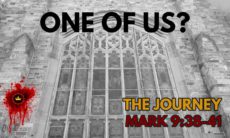Genesis: AUTHORITY
Saint & Sinner: Genesis 29:31-30:24
Pastor John Weathersby
Sunday August 20, 2023
Pastor John has done a great job leading us to where we are today; Jacob runs his brother to Mesopotamia and, along the way, has a dream of a stairway where he receives a vision from God with a promise that he, Jacob, receives the same covenant promise given to Abraham and Issac – this is where we pick up, but keep fresh in your mind God working His unthwartable sovereign plan, among, through, around, and sometimes despite a sinful people.
Let this be a great reminder of the truth in:
Romans 11:36 (ESV)
36 For from him and through him and to him are all things. To him be glory forever. Amen.
I pray that in our passage today, we’ll see a lasting principal and a NT call for us to live out redeemed lives in Christ together – and let us not abandon the truths of Genesis 30 in doing so.
Genesis 29:31–30:24 (ESV)
Jacob’s Children
31 When the Lord saw that Leah was hated, he opened her womb, but Rachel was barren.
Recall last week, this odd saga with Jacob. Jacob goes to Paddan Arram to live with his uncle Laban. He meets Laban’s daughter Rachel and agrees to work seven years for the right to marry her. That’s dedication, y’all. Then, the sister Leah comes out veiled, and after consummation, Jacob realizes what happened, then agrees to 7 more years of work – now I don’t know how you did in math, so let me help you out – that’s 14 years. I mean, she went from 16 to 30 quickly.
So 14 years of work, two wives, and they’re on their own now, one big …happy… family. We started in 31. Leah is hated. All right – rough. NASB said she was unloved, NIV said she was not loved, and LSB was unloved. ESV takes the more literal of the word (by nature of its translation goals) and says hated. Either way – fair to say there is tension in the tent. It is no secret that there is a favorite, and Leah isn’t it.
God opened Leah’s womb, yet Rachel (the 14-year version) was barren, with no kids.
32 And Leah conceived and bore a son, and she called his name Reuben, for she said, “Because the Lord has looked upon my affliction; for now my husband will love me.”
33 She conceived again and bore a son, and said, “Because the Lord has heard that I am hated, he has given me this son also.” And she called his name Simeon.
34 Again she conceived and bore a son, and said, “Now this time my husband will be attached to me, because I have borne him three sons.” Therefore his name was called Levi.
35 And she conceived again and bore a son, and said, “This time I will praise the Lord.” Therefore she called his name Judah. Then she ceased bearing.
This whole story becomes vital to the trajectory of this story, Genesis, the progressive revelation of God’s word, and through the tension of this family to Genesis 50:20 through Joseph.
Genesis 50:20 (ESV)
20 As for you, you meant evil against me, but God meant it for good, to bring it about that many people should be kept alive as they are today.
That same Joseph who was one of the 12 leaders of the 12 tribes of Israel, who saved the family and enabled their journey/passage to Egypt, where Moses would be born, the law revealed, and untimely the progressive revelation paving the way for the promised Messiah of Genesis 3:15. This is a story of God’s sovereignty through, with, and sometimes around or despite His people.
Genesis 3:15 (ESV)
15 I will put enmity between you and the woman, and between your offspring and her offspring; he shall bruise your head, and you shall bruise his heel.”
So now Leah focused on God and his blessings envied, as we’ll see shortly by her sister and by God’s grace, has had four sons, Ruben, Simeon, Levi, and Judah.
30:1 When Rachel saw that she bore Jacob no children, she envied her sister. She said to Jacob, “Give me children, or I shall die!”
2 Jacob’s anger was kindled against Rachel, and he said, “Am I in the place of God, who has withheld from you the fruit of the womb?”
3 Then she said, “Here is my servant Bilhah; go in to her, so that she may give birth on my behalf, that even I may have children through her.”
4 So she gave him her servant Bilhah as a wife, and Jacob went in to her.
5 And Bilhah conceived and bore Jacob a son.
6 Then Rachel said, “God has judged me, and has also heard my voice and given me a son.” Therefore she called his name Dan.
7 Rachel’s servant Bilhah conceived again and bore Jacob a second son.
8 Then Rachel said, “With mighty wrestlings I have wrestled with my sister and have prevailed.” So she called his name Naphtali.
Rachel doesn’t go to God in prayer. She stews in envy toward her sister and devices a pan after telling Jacob, “Give me kids or I’ll die”, for Jacob to have children with Bilhah – Jacob enters marriage #3, and Dan is born – then Naphtai as a victory march for having kids in addition to Rachel.
9 When Leah saw that she had ceased bearing children, she took her servant Zilpah and gave her to Jacob as a wife.
10 Then Leah’s servant Zilpah bore Jacob a son.
11 And Leah said, “Good fortune has come!” so she called his name Gad.
12 Leah’s servant Zilpah bore Jacob a second son.
13 And Leah said, “Happy am I! For women have called me happy.” So she called his name Asher.
OK, the sisters, Jacob, and the baby race has resulted in now a 4th marriage and
(Leah —>) Ruben, Simeon, Levi, and Judah, (Rachel/Beihah —> Dan, Naphtali), (Leah/Zilpah —>) Gad, Asher – so we’re at 8, on the way to 12.
14 In the days of wheat harvest Reuben went and found mandrakes in the field and brought them to his mother Leah. Then Rachel said to Leah, “Please give me some of your son’s mandrakes.”
15 But she said to her, “Is it a small matter that you have taken away my husband? Would you take away my son’s mandrakes also?” Rachel said, “Then he may lie with you tonight in exchange for your son’s mandrakes.”
16 When Jacob came from the field in the evening, Leah went out to meet him and said, “You must come in to me, for I have hired you with my son’s mandrakes.” So he lay with her that night.
17 And God listened to Leah, and she conceived and bore Jacob a fifth son.
18 Leah said, “God has given me my wages because I gave my servant to my husband.” So she called his name Issachar.
Can you imagine what life was like with these people? There are four marriages, two are sisters, and they’re in open contention with each other. And they’re still among their Father in Law! Here, one buys a night alone with the husband in exchange for a fertility drug, and Leah now has Issachar.
(Leah —>) Ruben, Simeon, Levi, and Judah, (Rachel/Beihah —> Dan, Naphtali), (Leah/Zilpah —>) Gad, Asher (Leah —>, Issachar)
19 And Leah conceived again, and she bore Jacob a sixth son.
20 Then Leah said, “God has endowed me with a good endowment; now my husband will honor me, because I have borne him six sons.” So she called his name Zebulun.
21 Afterward she bore a daughter and called her name Dinah.
(Leah —>) Ruben, Simeon, Levi, and Judah, (Rachel/Beihah —> Dan, Naphtali), (Leah/Zilpah —>) Gad, Asher (Leah —>, Issachar, Zebulun), and we see mention of Dinah, a daughter to Joseph.
22 Then God remembered Rachel, and God listened to her and opened her womb.
23 She conceived and bore a son and said, “God has taken away my reproach.”
24 And she called his name Joseph, saying, “May the Lord add to me another son!”
(Leah —>) Ruben, Simeon, Levi, and Judah, (Rachel/Beihah —> Dan, Naphtali), (Leah/Zilpah —>) Gad, Asher (Leah —>, Issachar, Zebulun), (Rachel —>) Joseph). Later in Genesis 35, Rachel will have one final son Benjamin and die in labor with him.
This chapter does carefully preserve the name and the meaning of the name for each of his 12 sons. Some have pontificated that the names point to the trajectory of a believer’s life:
“Reuben, Jacob’s firstborn, means, See, a Son! This is just what God says to us through the Gospel: to the Son of His love we are invited to look—“Behold the lamb of God.” Then comes Simeon whose name signifies Hearing and this points to the reception of the Gospel by faith, for faith cometh by hearing, and the promise is, “Hear, and your soul shall live.” Next in order is Levi and his name means Joined, telling of the blessed Union by which the Holy Spirit makes us one with the Son through the hearing of the Word. In Judah, which means Praise, we have manifested the Divine life in the believer, expressed in joyous gratitude for the riches of grace which are now his in Christ. Dan means Judgment, and this tells of how the believer uncompromisingly passes sentence upon himself, not only for what he has done but because of what he is, and thus he reckons himself to have died unto sin. Naphtali means Wrestling and speaks of that earnestness in prayer which is the very breath of the new life. Next is Gad which means a Troop or Company, speaking, perhaps of the believer in fellowship with the Lord’s people, and Jacob’s eighth son announces the effect of Christian fellowship, for Asher means Happy. Issachar means Hire, and speaks of service, and Zebulon which signifies Dwelling reminds us that we are to “occupy” till Christ comes; while Joseph which means Adding tells of the reward which He will bestow on those who have served diligently and occupied faithfully. Benjamin, the last of Jacob’s sons, means Son of my right hand, again speaking directly of Christ, and so the circle ends where it begins—with our blessed Lord, for He is “The First and the Last.” (Gleanings in Genesis A. Pink).”
These are Joseph’s sons. As we mentioned, this is where we’ll find the 12 tribes of Israel. How? Joseph and Levi are not a named tribe; Ephraim and Manasseh are added to the sons their sons Joseph (Jacob’s youngest son) had while in Egypt. They’ll be adopted by Jacob and bestowed blessings as Jacob lays out the patriarchal line at his death, where God will deliver the law and Messiah to the world – through this kicking, fighting, jealous, contentious family of 4 marriages and competitive childbearing.
What truth is Romans 11:36
Romans 11:36 (ESV)
36 For from him and through him and to him are all things. To him be glory forever. Amen.
From him, through him, and to him – are all things, for His glory. Even the redemption and involvement of sinfully motivated and charged individuals whom he redeemed to himself.
Why:
1 Corinthians 1:27–31 (ESV)
27 But God chose what is foolish in the world to shame the wise; God chose what is weak in the world to shame the strong;
28 God chose what is low and despised in the world, even things that are not, to bring to nothing things that are,
29 so that no human being might boast in the presence of God.
30 And because of him you are in Christ Jesus, who became to us wisdom from God, righteousness and sanctification and redemption,
31 so that, as it is written, “Let the one who boasts, boast in the Lord.”
Whenever I discuss the Church family and getting along, I think of this story and Uncle Laban. Churches are gathered sinners in one single place, worshipping God, redeemed in Christ.
Luther said that we are Simultaneously Saint & Sinners.
“Thus a Christian person is righteous and a sinner at the same time, holy and profane, an enemy of God and a child of God. None of the sophists will admit this paradox, because they do not understand the true meaning of justification. This was why they forced men to go on doing good works until they would not feel any sin at all. By this means they drove to the point of insanity many people who tried with all their might to become completely righteous in a formal sense but could not accomplish it. And innumerable persons even among the authors of this wicked dogma were driven into despair at the hour of death, which is what would have happened to me if Christ had not looked at me in mercy and liberated me from this error.”
And:
“Thus a Christian remains in pure humility. He really and truly feels that there is sin in him and that on this account he is worthy of wrath, the judgment of God, and eternal death. Thus he is humbled in this life.”
Why say this? Because we’ll see the nature of running through this entire passage narrative and the hand of God’s sovereign plan, accomplishing his will despite wicked rebellion and selfish purposes. It’s a great reminder to the redeemed that God is at work in us, through us, and sometimes around or in spite of us – it is a great reminder to take stock of our intentions, hearts, and relationships.
Perhaps it’s been a while since you’ve had an opportunity to fall significantly, whether into a moral or another sin. Seeing nature and passion for the sin(s) recorded here helps give us a better-looking glass into ourselves if we allow it. We would do well to remember that God’s unthwartable sovereign plan works, among, through, around, and sometimes despite sinful people.
Church, let us take a deep breath, and as redeemed NT believers who have the fullness of this Word soak up this truth in the light of Genesis 30:
Hebrews 12:1–3 (ESV)
1 Therefore, since we are surrounded by so great a cloud of witnesses, let us also lay aside every weight, and sin which clings so closely, and let us run with endurance the race that is set before us,
2 looking to Jesus, the founder and perfecter of our faith, who for the joy that was set before him endured the cross, despising the shame, and is seated at the right hand of the throne of God.
3 Consider him who endured from sinners such hostility against himself, so that you may not grow weary or fainthearted.
This is the peace that God gives us in Christ, and we’re blessed with a church family, of simultaneous saints and sinners, to actualize that life, let us live it out, together, which is the call.
Pray, Observe, Apply.









